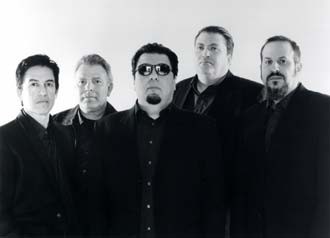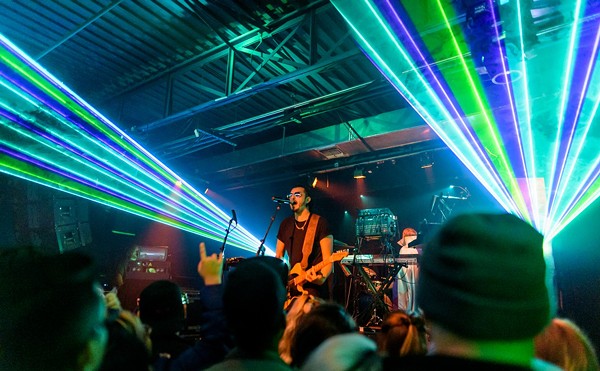|
Los Lobos cruise into their fourth decade together Things get complicated when you follow someone's life for three decades. People grow older, wiser (hopefully), and as they take on new responsibilities, they gain new insights, new ways of understanding the world around them. Some of us change drastically, some in barely perceptible ways, but we carry within us the sum total of our experiences: our trials and tribulations, as well as our aspirations. Not long ago the guys in Los Lobos scratched their heads over what to do to celebrate their 30th anniversary as a group. "What do most people do when having a birthday? They throw a party," Louie Pérez, drummer, lyricist, guitarist, and resident philosopher, explains. With that in mind, Los Lobos invited their "heroes and influences" - an international assembly of musicians like salsero Rubén Blades and soul singer Bobby Womack, Mexican rockeros Café Tacuba, Brit singer-songwriter Elvis Costello, the ever-eccentric Tom Waits, virtuoso sideman Garth Hudson (The Band), and Willie Garcia, better known as Willie G from Thee Midnighters, an iconic East L.A. band around when the Lobos were teenagers. ("They were like the Beatles to us," says Pérez.) - to a musical party and pressed "play" on the recording machine. Out of their collaborations came The Ride, a collection of new compositions and Lobos classics, reimagined and reinterpreted by their illustrious guests. "There's no A-list or B-list; it was all important," says Pérez. And without exception, The Ride rocks, from its driving opener, "La Venganza de Los Pelados," with Café Tacuba, to Bobby Womack's soulful segue from "Wicked Rain" into his "Across 110th Street," to the group's own bluesy "Chains of Love," which closes the disc. Far too often, multi-guest albums featuring the latest flavors of the month tend to mark a group's creative death knell, especially when the album is commercially successful. The Ride succeeds, in no small part, because it wasn't designed that way. "If we could have brought in pop superstars it wouldn't have been the Lobos aesthetic," Pérez explains. "We're regular people. That's what connects us to our fans and our people." Pérez, along with vocalist, guitarist, and accordionist David Hidalgo, guitarist Cesar Rosas, and bassist Conrad Lozano, were playing in rock bands while students at East Los Angeles' Garfield High in the late '60s and early '70s when they traded their electric guitars for the requinto jarochos, bajo sextos, and hefty guitarróns of traditional Mexican music and formed Los Lobos del Este (de Los Angeles). Political change was fomenting, and for Chicano kids in the barrios of East L.A. this meant school walkouts protesting discriminatory education, mass marches against the war in Vietnam, hunger strikes, grape boycotts, and hearty doses of cultural pride encountered through the performing, visual and literary arts. Pérez cannot say for sure what motivated their progression into Mexican music, rhetorically asking, "How do kids right out of high school think of wanting to express themselves?" But he does remember that playing straightforward rock "just wasn't fun anymore." It had become formulaic: "You learn note by note, recreate that, and play in nightclubs." In contrast, the traditional music was rewarding and challenging at the same time. "We didn't realize what we were doing. We didn't have much to worry about. We just did it because it felt right and was fun to do," he says. Still in their infancy, the band cut their teeth playing quinceañeras and weddings. Their 1978 self-titled debut release, as well as their contribution to a benefit recording for the United Farm Workers, captured their sound and aesthetic. After playing rock and regional Mexican music for a decade, the band began experimenting with the rhythms of Texas-Mexican border music - the polkas and rancheritas permanently associated with this region. Although you wouldn't know it from listening to the rousing numbers on their 1983 EP ...and a time to dance (like the Grammy-winning single "Anselma") their Tejano roots were tenuous, at best. (While following the migrant trails northward Pérez says his mother's family passed through El Paso en route to Cheyenne, Wyoming, before moving to Los Angeles in the 1920s.)
In 1983, Steve Berlin left the Blasters to join the wolves, taking his saxophone and keyboard skills with him. More than 20 years later, he remains the newest member of the band. Since Berlin, no one has joined - and no one has left. Pérez attributes their longevity to the enthusiasm they continue to share, and to their willingness to invent and experiment (best exemplified on their dreamlike 1992 album Kiko, and their two subsequent releases, Colossal Head and This Time). "We're still excited about it, even though we're a litter creakier," he jokes. "It's not only the mortgage payment, it's also the music." That music takes many forms, and encompasses a wide range of subtle influences. "There's lots of interesting things going on in the background. We still listen to rock 'n' roll. A lot of Caribbean and South American, Latin music somehow make it into what we're doing," Pérez says, acknowledging the vallenato rhythm backing "Kiko and the Lavender Moon," their ethereal, transcendent title tune from Kiko, as well as the much more straightforward cumbia and salsa beats on "Cumbia Raza" (off of 1999's This Time) or "Ya Se Va," their collaboration with Ruben Blades on The Ride. "Not that we've been on some crusade or mission," but through the years Los Lobos has broken down some barriers and opened some doors for Latinos and other musicians "out of necessity and our own personal need," Pérez notes, naming opening acts and contemporary groups who have followed in their wake - some of whom have gone on to become household names and arena idols. On the surface, at least, it appears that there is a greater acceptance of a Latino-influence in pop and mainstream music. In spite of this welcoming trend, Pérez believes that Los Lobos, as trailblazers, have carved out a niche that might be "too rock 'n' roll for Latin tastes, too Latin for white tastes." "I'd like to see more brown faces in the audience," he laments. At one time in places outside of the southwest, where they have always enjoyed a bilingual, bicultural fan base, it was simply a matter of demographics. "But now things have changed," Pérez says. "We've seen the whole face of the country change. The face is brown, man. We're everywhere." •
|
Más y más
Thu, Dec 2, 2004 at 12:00 am

KEEP SA CURRENT!
Since 1986, the SA Current has served as the free, independent voice of San Antonio, and we want to keep it that way.
Becoming an SA Current Supporter for as little as $5 a month allows us to continue offering readers access to our coverage of local news, food, nightlife, events, and culture with no paywalls.
Scroll to read more Music Stories & Interviews articles
Newsletters
Join SA Current Newsletters
Subscribe now to get the latest news delivered right to your inbox.
















